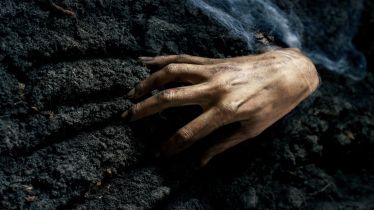Sierra Leone, a West African country, is in crisis due to the menace caused by a highly addictive psychoactive drug, xylazine, sometimes known as “tranq”. The country’s president, Julius Maada Bio, has declared a national emergency over rampant abuse of the ‘Zombie Drug’.
Often dubbed ‘Kush’, the drug has shook the nation as the addicts are now digging up graves to make the drugs from human bones. According to a BBC report, the addicts have turned into grave robbers and they are allegedly exhuming skeletons for the ‘Zombie Drug’ production.
The ‘Zombie Drug’ is made from a variety of toxic substances and powdered human bone is one of the main ingredients. To thwart the disturbing practice, the authorities have tightened the security in cemeteries to stop addicts digging up skeletons from graves.
Meanwhile, President Julius Maada Bio called the drug a “death trap” and said it posed an “existential crisis”. The abuse of this psychoactive substance is so rampant that the Sierra Leone Psychiatric Hospital, the country’s only institution of its kind, says between 2020 and 2023, admissions linked to kush surged by almost 4,000% to reach 1,865, BBC reported.
In a nationwide broadcast on Thursday night, President Bio said: “Our country is currently faced with an existential threat due to the ravaging impact of drugs and substance abuse, particularly the devastating synthetic drug kush.”
According to BBC, the President has also directed officials to set up a National Task Force on Drugs and Substance Abuse, which will primarily focus on “combatting the kush crisis”. The drug concoction has reportedly been prevalent in the country for years. Currently, Freetown is home to the country’s only functioning drug rehabilitation centre and around 63 percent of the hospital’s current patients were admitted with kush-related problems, BBC reported.
What is ‘Zombie Drug’?
Xylazine or ‘Zombie Drug’ is a non-opioid sedative or tranquilizer and the drug is prescribed for veterinary purposes. According to the Centers of Disease Control and Prevention (CDC), is increasingly being found in the US illegal drug supply and linked to overdose deaths.
CDC maintains that can be life-threatening and is especially dangerous when combined with opioids like fentanyl. The ‘Zombie Drug’ is often mixed with illegal drugs like cocaine, heroin, and fentanyl, either to enhance drug effects or increase street value by increasing their weight.
The highly addictive concoction is called ‘Zombie Drug’ because the person consuming this drug will have an unconscious, shambling appearance like a Zombie and a tendency for wounds to appear randomly before necrotizing causing a ‘flesh-rotting’ effect.
How does the ‘Zombie Drug’ affect human body?
The drug induces a hypnotic high which can last several hours. Reportedly, the ‘Zombie Drug’ makes the user fall asleep within n the first 20 to 30 minutes after use, after which they’ll be deeply sedated for several hours. If left undisturbed, pressure sores and other complications can arise from lying in a single position for hours on end.
Studies suggest death can occur at any moment for an unconscious individual under its effects. The ‘Zombie Drug’ can cause severe depression in the normal functioning of our central nervous system, meaning people relax to such a degree that they’ll choke to death on their tongue without realizing it.
In some cases, people also suffocate in their vomit without receiving any signals of distress to move or wake up like they would have done under the effects of a less potent drug.
According to CDC, xylazine can cause:
- sedation
- difficulty breathing
- dangerously low blood pressure
- slowed heart rate
- wounds that can become infected
- severe withdrawal symptoms
- death
What to do in case of xylazine overdose?
Naloxone should be given in response to any suspected drug overdose to reverse any possible opioid effects, CDC states. The US public health agency maintains that although Naloxone will not reverse the effects of xylazine, it should still be given as xylazine is often used with opioids like fentanyl. Meanwhile, the person should be given emergency medical facilities immediately.
